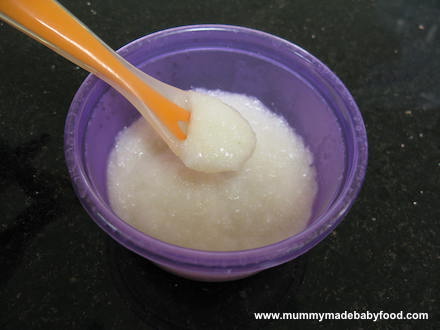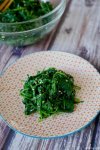- Serves 4
- Nutrition
A Guide to Baby and Toddler Nutrition
This page may contain affiliate links, which means we receive a small commission for purchases made using the links. There is no additional cost to you. Please read our full disclosure policy.
Navigating the territory of baby and toddler nutrition can be quite tricky.
You know your baby should be eating healthy foods, but you aren’t sure exactly what you should be feeding him. And, if you’re like me, you’re constantly trying to get him to eat ‘just one more bite,’ even if he seems uninterested in his food!
When it comes to nutrition, it is important to keep the big picture in mind. Remember that babies grow extremely quickly in the early weeks and months, right up through about the first year. As a result, they need to eat a lot in order to develop healthily.
Beyond his first birthday, your child’s rate of growth tends to slow dramatically. Therefore, his required calorie intake will also drop, and it is not uncommon to see toddlers’ appetites decreasing during their second year.
When approaching the topic of baby and toddler nutrition, it is important to maintain a degree of flexibility. Whilst your child may not eat what you want, when you want, as long as he is consistently gaining weight and maintaining normal growth, you do not need to be too concerned. It is advisable to speak to your paediatrician or health advisor, if you have any concerns.
Milk Requirements - The First 6 Months
Perhaps the most important aspect of baby and toddler nutrition is how much milk they should be drinking. For about the first 6 months of most babies’ lives, their sole source of nutrition and hydration will come from the milk they drink.
As a general guideline, before baby has started solid foods, he needs about 150-200ml (5-7oz) of milk per kilogram of body weight per day. Obviously, each baby’s appetite varies, and some will take more than the average and some less – let yourself be guided by baby here.
If your baby is formula fed, then it is very easy for you to calculate how much milk he is drinking per day. But if your baby is breastfed, either solely or in combination with formula milk, then measuring his milk intake is not such a precise science, and you will have to watch his weight gain over weekly intervals. As long as he is gaining consistently, you can rest assured that he is taking what he needs.
As a newborn, baby’s stomach will be about the size of a walnut and therefore not be able to hold very much milk! Newborns drink approximately 30-60ml (1-2oz) of milk per feed.
From about 1 month old, a healthy and thriving baby will drink about 90-120ml (3-4oz) of milk per feed. This increases to about 120-180ml (4-6oz) of milk per feed when baby is 2-6 months old. In the early months, baby goes through many growth spurts, and you may find that his appetite suddenly increases accordingly!
From 6 months onwards, baby can usually drink 180-220ml (6-7oz) or more per feed. If you find baby is still hungry after drinking this amount of milk and he is not yet 6 months, you may need to consider weaning him onto solid food early, after speaking with your paediatrician or health advisor.
When to Introduce Water and Fruit Juice
Whilst formula or breast milk alone will provide most babies with all the nutrition and hydration they need during their first 6 months, from the time weaning begins, babies can have a small drink of water with snacks to provide extra hydration. I found it easiest to introduce water as a drink over time, so that baby doesn’t reject it when you need him to drink it!
Although most babies will not need it, from about 4 months, you can begin to introduce a few sips of cool boiled water into your baby’s diet in the afternoons, to get him used to the taste and texture. He should then be accustomed to the taste by the time weaning begins and be less likely to refuse it.
Most children love fruit juice, but it is a good idea to limit the amount your baby drinks, as too much of it can reduce his appetite for milk and/or solid food. Instead, offer him lots of fresh fruit, which contain healthy fibre in addition to the juice.
It is also very easy for babies to become ‘addicted’ to fruit juice and thus refuse to drink anything else. If you are going to offer your baby juice, introduce it from 6 months onward and make sure it is very well diluted with water, especially during his first year.
Once baby is established on solid food, he can drink more water as part of his diet to stay hydrated. Eating whole (unprocessed) foods is also an important part of baby and toddler nutrition, as they contain the highest proportions of naturally occurring fluids.
If you are concerned about baby’s hydration, offer him sips of water or well-diluted juice throughout the day. You can also give him more fresh fruit with higher water content, such as citrus fruits or melons.
If you are at all unsure about when to start offering your baby water or fruit juice as a drink, speak to your paediatrician or health advisor.
Milk Requirements - During Weaning
Once you begin weaning baby onto solid foods, you will probably find that his appetite for milk decreases. This is only natural, as his nutritional needs are now being met by solid foods in addition to milk.
Although it will vary between babies, average milk intake after starting weaning tends to drop to approximately 720ml (24oz) per day. This drop in fluid intake is generally made up for by drinking water and/or well-diluted juice and by eating whole foods.
Once baby is established on solids, he needs a minimum of 500-600ml (17-20oz) of milk per day, assuming he is eating a varied diet. This can be split across his milk feeds and milk used in cooking and preparing his meals.
Some babies of this age may go off milk as a drink, once solid foods have been introduced. If your baby is one of these, it is important to remember that there is a lot of flexibility when it comes to baby and toddler nutrition. Feed him more meals with cheesy sauces, give him cheese to snack on, or incorporate yoghurt or other milky snacks into his diet.
Toddler Nutrition
There is more flexibility when it comes to toddler nutrition. From the age of 1, if your little one is established on a varied diet of solid foods, you can start offering him full-fat cow’s milk as a drink. Toddlers of this age still need the nutrition from milk fat, so make sure you give him full-fat milk until at least the age of 2.
There is no need to give your toddler follow-on formula milk, if he is eating a balanced diet. By this age, the majority of his nutritional requirements will be met by the solid food he eats, although he will still need a minimum of 350ml (12oz) of milk per day.
It is important not to let your toddler drink too much milk at this age, as it will reduce his appetite for solid foods. Cow’s milk does not provide sufficient nutrition to meet your toddler’s ever-growing needs, and it is important that he continues to eat well at mealtimes. Therefore, cow’s milk should only be offered as an occasional drink. If your toddler is thirsty, offer him water to drink instead.
As your toddler grows, try to develop his taste for fresh, whole and unprocessed foods. Whilst the ease and convenience of commercially processed baby food is difficult to resist, they may end up causing long-term health problems for your child. Processed foods do nothing for toddler nutrition, and research has actually demonstrated that they are a leading cause of many of the health problems that adults today face.
The table below summarises the broad requirements for toddler nutrition. Ideally, your toddler should be eating a wide variety of foods from across the four major food groups:
Food Group
Daily Needs
Fruits and vegetables
4 servings
Grains, including cereals, bread, rice, pasta and other starchy foods
4 servings
Protein from non-dairy sources, including meat, fish, eggs, tofu, beans and pulses
2 servings
Milk and dairy products
480-720ml (16-24oz)
Although individual toddler appetites will vary, roughly speaking, a toddler serving size is equal to about 1 Tablespoon (15ml) per year of age.
The American Academy of Pediatrics recommends that children from 1 to 3 years of age consume about 40 calories per inch of height per day. (1 inch = 2.54 cm) So your 34in (90cm) tall toddler needs about 1,360 calories per day to maintain normal growth and weight gain.
It may all seem like a minefield, toddler nutrition in particular, but as long as yours is eating a balanced diet on average and gaining weight normally, there is no need to worry. Toddler appetites will vary day to day, so it is best to measure what they eat across a longer stretch of time, such as a week, and then average their daily intake.
What's on your mind?
Let us know any thoughts, comments or questions by getting in touch here.







